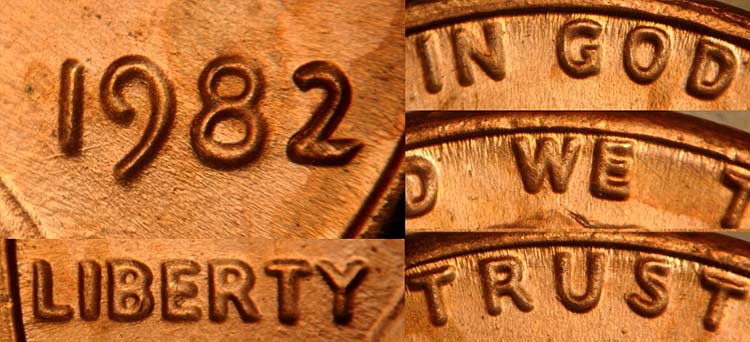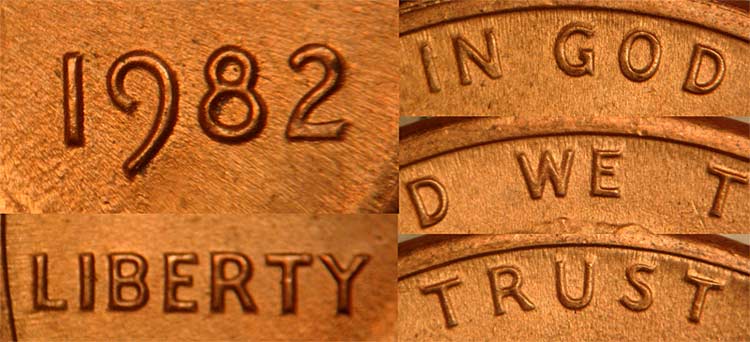sort 1982 cents
Sorting 1982 cents has always been considered a pain, however they are actually very
simple. The date sizes are easy to tell apart, and a scale is unnecessary in determining
the metal types apart. All of the directions below, both for date size sorting and
for metal type sorting apply to both the Philadelphia "plain" cents and the D mint cents of Denver.
First, the date sizes...
by date size
Side by side, the difference is obvious and needs no explanation. All of the letters of LIBERTY
and the motto are thick and distorted on the large date, and are thinner and crisper on the small
date. The date itself is larger and thicker on the large date, and thinner on the small date. Some points to pay
attention to when you do not have them side by side:
- The top and bottom circles of the 8 are the same size on the large date. On the small
date, the top circle is smaller than the bottom circle.
- The 2 digit on the large date drops straight diagonally from the top curve. On the
small date there is a distinct curve in the diagonal part of the digit.
- The O of GOD is oblong and has a nearly flat top on the large date. The small date O
is much more round and well-shaped.
- The letters of LIBERTY are thick and distended on the large date, and have a
much cleaner appearance on the small date.
images
1982 Large Date (mint does not matter):

1982 Small Date (mint does not matter):

sorting the metals
From 1962 until 1982 cents were made of a 95% copper, 5% zinc alloy - commonly called
'brass'. Their normal weight is 3.11 grams. During the latter half of the year in 1982
the mint changed the composition of the cent to a solid core of zinc plated in 100% copper.
The normal weight for these coins is 2.5 grams.
They are easy to differentiate without a scale--all it takes is a good ear. Using
a hard surface made of wood or glass, drop a known copper cent (up to 1981) and listen
for a distinct high-pitch ring sound. Then drop a known zinc cent (1983 to date) on
the same surface and listen...no ring. It sounds more like you would expect lead to sound
when dropped. Sort of like a 'thud'. Do this a few times and you should get the hang of
it.
A better method, the one I used when I was a kid, is to let the coin hit a glass
surface then drop a couple of feet to a pillow or the carpet (to cushion the fall).
This will give your ears a couple of seconds to adjust and listen for the sound. Sometimes
just dropping them against a table isn't enough for some people.
|



